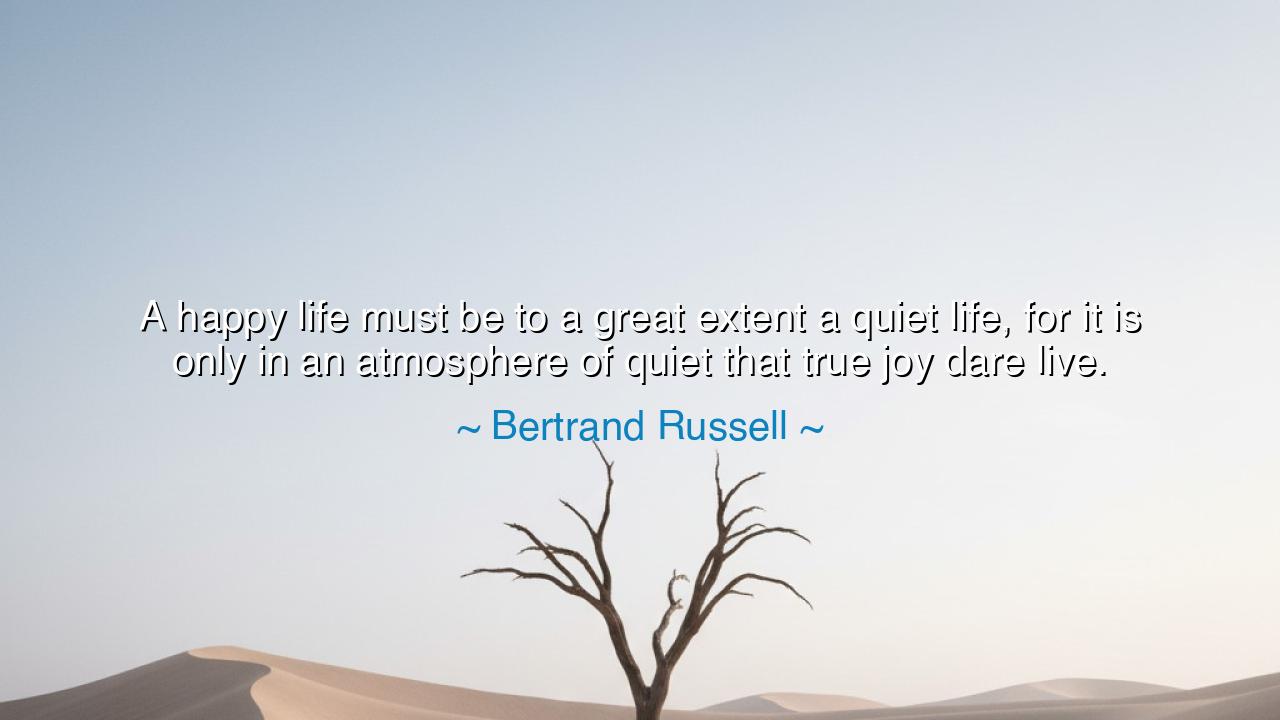
A happy life must be to a great extent a quiet life, for it is
A happy life must be to a great extent a quiet life, for it is only in an atmosphere of quiet that true joy dare live.






Hear, O child of the restless age, the quiet wisdom of Bertrand Russell, the philosopher who sought peace amidst the roaring storms of modern life: “A happy life must be to a great extent a quiet life, for it is only in an atmosphere of quiet that true joy dare live.” In this saying, Russell does not praise the silence of emptiness, but the stillness of the soul—the calm waters in which the reflection of truth may be clearly seen. For joy, like a delicate flower, cannot bloom in the chaos of noise and haste; it blossoms only where the heart is still, and the mind rests in harmony with itself.
Russell spoke these words in the early twentieth century, an age that, like ours, was trembling with invention, conflict, and ceaseless movement. The world had learned to make machines that could fly and kill, but it had forgotten how to be still. He saw in this whirlwind of progress a new kind of poverty—the poverty of peace. Thus he taught that true happiness is not born of possessions, fame, or power, but from a quiet mind that needs little and fears nothing. His wisdom echoes the voices of the ancients, who too knew that serenity is the highest form of strength.
For what is quiet but the resting place of the spirit? The sages of old withdrew into the mountains and the deserts, not to escape life, but to discover it more deeply. Lao Tzu, the ancient master of the Tao, taught that water, though soft and yielding, wears away stone. So it is with the soul at peace—it conquers not by force, but by stillness. And Marcus Aurelius, emperor of Rome, ruled a vast empire yet found his truest dominion within his own thoughts. “Nowhere can man find a quieter retreat,” he wrote, “than within his own soul.”
Consider the story of Leo Tolstoy, the great Russian writer. In his youth, he pursued glory and pleasure, yet his heart remained disquieted. Surrounded by luxury, he felt only emptiness. But when he turned to simplicity—to laboring beside peasants, to walking in fields, to reading the Gospels in silence—he discovered what Russell would later call the quiet life. His joy was no longer loud or fleeting, but deep and enduring. He had traded the noise of the world for the song of the spirit.
Russell understood that joy is a fragile thing. It flees from vanity, from envy, from the constant clamor of desire. True joy dare live only where peace dwells, for it is easily frightened by anger and greed. In the quiet life, there is space for gratitude, reflection, and love. A heart that beats in calm rhythm can perceive beauty where others see nothing—a child’s laughter, a bird’s flight, the soft light at evening. These are the treasures of the quiet soul, invisible to the restless eye.
But let none mistake quiet for idleness or weakness. The quiet life is not an escape from duty, but a way of performing it with grace. It is the art of doing without hurry, of serving without vanity, of loving without demand. The warrior may fight with calm purpose; the teacher may guide with steady patience; the artist may create in silence what no noise could inspire. For the quiet spirit does not withdraw from the world—it transforms it from within.
Therefore, O listener, learn to seek your own atmosphere of quiet. Turn off the noise that clamors for your attention, the endless striving for what fades with time. Rise early and greet the dawn in stillness. Walk without haste. Speak with gentleness. Let your mind rest like clear water after a storm. In this stillness, your heart will begin to hear what the world cannot teach: that peace is the womb of happiness, and that joy, once found, does not shout—it whispers.
So remember Russell’s timeless truth: “A happy life must be to a great extent a quiet life.” Guard your quiet as you would guard your breath. For in that sacred silence lives your truest self, your deepest wisdom, and your most enduring joy. And when the world grows loud and restless once more, you will carry within you the calm of eternity—the quiet flame that no storm can ever extinguish.






AAdministratorAdministrator
Welcome, honored guests. Please leave a comment, we will respond soon